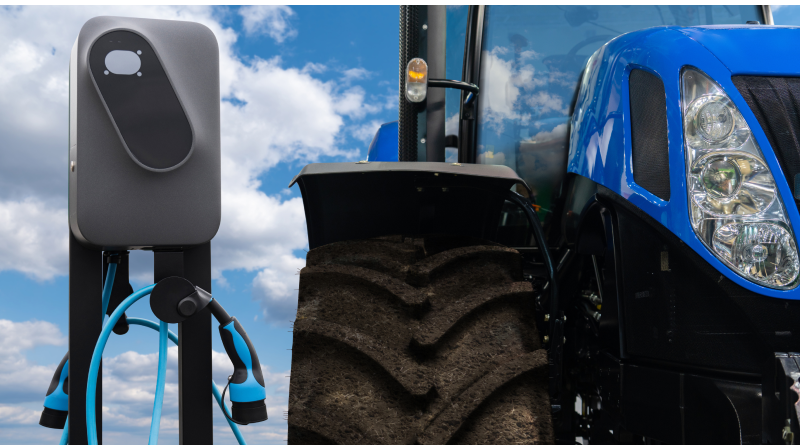Inspection tips for pickup trucks at auctions
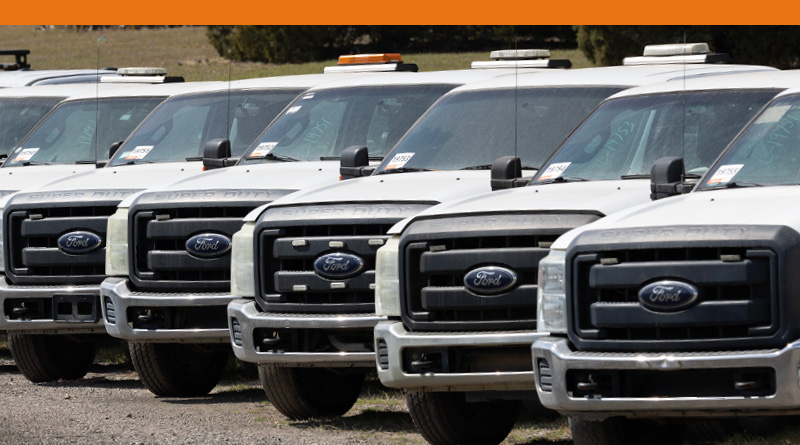
Before you place a bid on a pickup truck at auction, a careful inspection is one of the most important steps you can take to ensure your purchase delivers value. Trucks sold at auctions can come from a variety of sources, including construction companies, municipal fleets, and leasing agencies, each with its own maintenance history and wear patterns.
While reputable companies like Ritchie Bros. provide detailed condition reports and images, nothing replaces a thorough in-person or third-party inspection. The right evaluation will help you avoid unexpected repair costs, select a truck that meets your needs, and make an informed bidding decision.
Whether you are adding to a fleet, sourcing a reliable work vehicle, or looking for a truck that can handle specific hauling or towing duties, the inspection process should be methodical and focused on both the vehicle’s current condition and its long-term viability.
What should I look for when inspecting a pickup truck at auction?
Exterior and frame condition
Start with a walk-around inspection of the exterior. Look for dents, scratches, or rust that could indicate prior damage or neglect. Pay attention to panel gaps and paint variations, which can signal past accident repairs. Surface rust on body panels is common, but rust on the frame or structural components should be taken seriously, as it can compromise the truck’s strength. Inspect the bed for wear, corrosion, or evidence of heavy loads. A truck that has been used extensively for hauling may have dents or cracks in the bed floor. If the bed is equipped with tie-downs, rails, or a gooseneck hitch, check that these components are secure and show no signs of stress fractures.
Tires and wheels
Tire condition can offer insight into how a truck has been maintained. Uneven tread wear may indicate alignment issues, worn suspension components, or past overloading. Measure tread depth and look for cracks or bulges in the sidewalls. Wheels should be free from bends or significant curb damage.
If the truck will be used for heavy towing or jobsite work, verify that the tires meet the load rating requirements for those applications.
Lights, mirrors, and glass
Test all exterior lights, including headlights, brake lights, and turn signals. Non-functioning lights may be a minor fix, but they can also hint at electrical issues. Check mirrors for cracks or loose mounting. Windshields and side windows should be clear of large chips or cracks that might require replacement.
How do I check the mechanical condition before bidding?
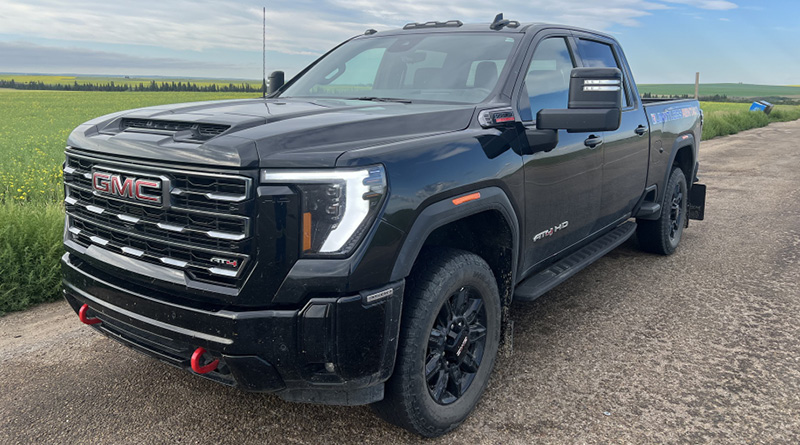
Engine
Open the hood and examine the engine bay for leaks, frayed belts, or damaged hoses. Check the oil level and condition; milky or foamy oil can indicate coolant contamination, while dark, thick oil may suggest overdue maintenance.
Start the engine and listen for unusual noises such as knocking or ticking. Watch for excessive exhaust smoke, which could indicate engine wear or internal damage. A well-maintained engine should idle smoothly without hesitation.
Transmission and drivetrain
Shift through all gears to ensure smooth engagement. Delayed or harsh shifting in an automatic transmission can point to expensive repairs. If possible, observe the truck moving forward and in reverse, paying attention to drivetrain noises or vibrations.
For four-wheel drive models, test the engagement of 4WD and low range if conditions allow. Inspect driveshafts and CV joints for signs of wear or torn boots.
Suspension, steering, and brakes
Bounce each corner of the truck to test suspension response. Excessive movement may mean worn shocks or struts. Inspect control arms, ball joints, and bushings for wear or damage.
Turn the steering wheel while stationary to check for play or stiffness. Brake pedals should feel firm, not spongy, and braking should be even without pulling to one side. Visually inspect brake rotors for deep grooves or scoring.
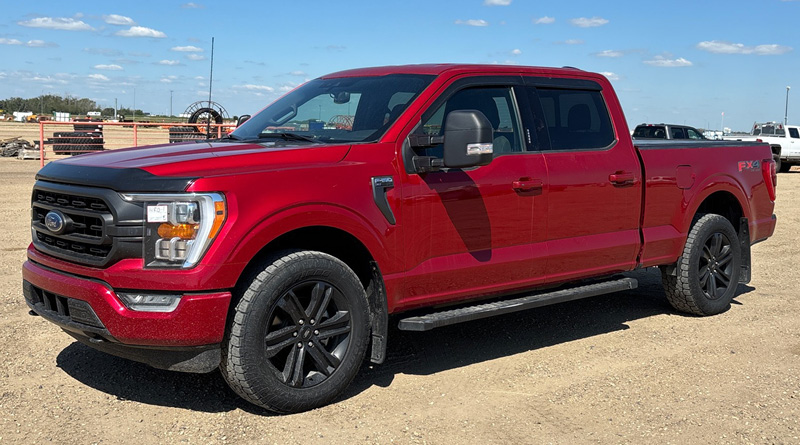
Should I bring a mechanic to a truck auction?
If you are not experienced with vehicle inspections, bringing a trusted mechanic can be one of the smartest investments you make. A qualified technician can identify hidden problems, estimate repair costs, and confirm whether a truck is worth pursuing. This is especially valuable for fleet buyers who need reliable vehicles from day one.
Some auctions also allow third-party inspection services, which can be arranged in advance. These services often include detailed photos, fluid analysis, and mechanical checks that go beyond a standard visual review.
Can I inspect a truck in person at online auctions?
For online auctions, condition reports and photos are the primary sources of information. However, companies like Ritchie Bros. will still provide an in-person inspection window before bidding opens. If travel is not practical, consider hiring a local inspector to view the truck on your behalf.
Study all available documentation, including service records and inspection reports, and request additional details from the auction house if something is unclear.
How do I research a pickup truck’s history before bidding?
A vehicle’s history can reveal accidents, title issues, or ownership patterns that influence value. Use the truck’s VIN to run a history report from a reputable provider. Look for salvage or rebuilt titles, which can reduce resale value and indicate past significant damage.
Compare the truck’s market value using pricing guides such as Kelley Blue Book or NADA. This helps set a bidding limit that reflects the vehicle’s true worth after accounting for any repairs.
10-Step pre-auction inspection checklist
- Exterior and frame – Inspect for rust, dents, panel gaps, and repainting.
- Tires and wheels – Check tread depth, wear patterns, and load ratings.
- Lights and glass – Confirm all lights function and glass is free from major cracks.
- Interior function – Test HVAC, power windows, locks, infotainment systems, and look for water damage or odors.
- Engine – Check oil condition, leaks, and listen for irregular sounds.
- Transmission and drivetrain – Ensure smooth shifting and check for unusual vibrations.
- Brakes and suspension – Inspect for wear, responsiveness, and stability.
- Vehicle history and title – Run a VIN check for accidents, title status, and odometer accuracy.
- Professional inspection – Hire a mechanic or third-party service if possible.
- Auction terms and fees – Understand buyer premiums, payment deadlines, and removal schedules.
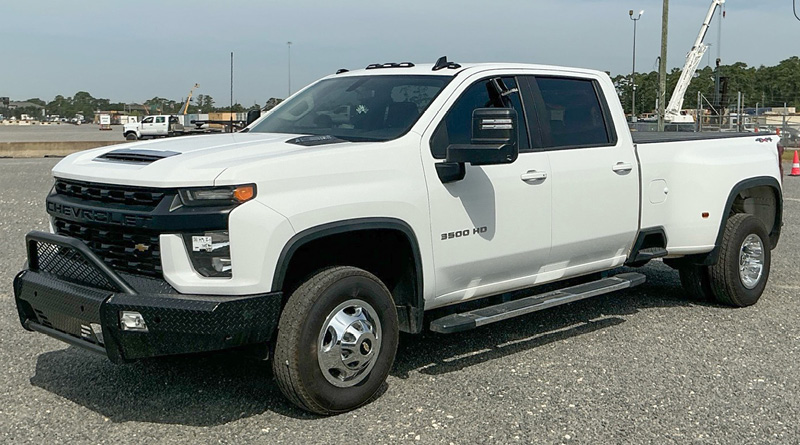
Specific considerations for fleet or commercial buyers
Fleet buyers often prioritize reliability and total cost of ownership. Trucks from utility or construction fleets may have higher mileage but also a documented service history. These records can be more valuable than low mileage without maintenance proof.
Inspect wear areas that affect productivity, such as the bed, hitch assemblies, and electrical connections for towing. Consider the truck’s configuration, including cab size, bed length, and powertrain, to ensure it aligns with intended use. For specialized applications, verify compatibility with existing fleet equipment and trailers.
Common red flags that should make you walk away
Some issues can be too costly or risky to take on. Walk away from trucks with:
- Significant frame or structural rust
- Evidence of flood damage
- Multiple active warning lights
- Odometer discrepancies
- Severe engine or transmission noise under load
- Missing title or unclear ownership documentation
These problems can lead to expensive repairs, downtime, and compliance challenges that outweigh any auction savings.
How to bid smart after inspection
Use your inspection findings to set a firm maximum bid before the auction begins. Factor in repair costs, transportation, and any modifications required to put the truck into service. Stay focused on your budget.
If similar trucks appear often at auction, patience can work in your favor. Passing on a questionable unit is better than rushing into a purchase that turns into a financial burden.
Conclusion
A thorough inspection is the most effective way to protect your investment when buying a pickup truck at auction. From evaluating the exterior and drivetrain to verifying service history and understanding auction terms, each step adds confidence to your decision. For fleet managers, contractors, and individual buyers alike, taking the time to inspect can mean the difference between securing a dependable workhorse and facing costly downtime.
Approach every auction with a checklist in hand, a clear budget, and the knowledge of what makes a pickup truck worth your bid. By combining preparation with careful evaluation, you can find the right truck at the right price while avoiding the pitfalls that come with buying at auction.
 |
How Ritchie Bros. delivers global scale for your assets |





